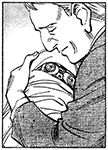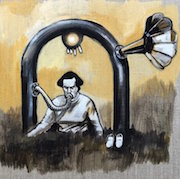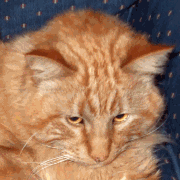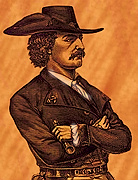|
What's the consensus on Joyce's work outside his four books, namely his one play and poetry collection? I'm not counting any private letters or correspondence, god no.
|
|
|
|

|
| # ? May 3, 2024 09:39 |
|
Simultaneously amazed and impressed that nobody has posted the Nora letter yet.
|
|
|
|
Inspector Gesicht posted:What's the consensus on Joyce's work outside his four books, namely his one play and poetry collection? I'm not counting any private letters or correspondence, god no. Haven't read the play, but his poetry is good. Except the stuff he wrote as a teenager that's quoted in Ellmann's biography, which is hilariously bad.
|
|
|
|
bumping for discussion of Ulysses from the group reading soon to start I was actually going to start it today but got distracted by another book long on my to read pile, but that should be done in a day or two. May start Ulysses tonight anyway.
|
|
|
|
|
Aw hell, started it. Last time I made it around 250 pages or so before just losing interest for whatever reason, and I toyed with just starting there. Glad I did not because I remember none of this. Opening breakfast scene was wonderfully chaotic and sets the initial personalities and conflicts off well. I also realized just now how much of this Garth Ennis "borrowed" for one story line of an overly exuberant Irishman living in a tower (lighthouse in that case IIRC), if I can introduce a little low brow culture to this literary thread
|
|
|
|
|
Chapter two: Stephan at school with the kids and the scene with Mr. Deasy. A shocking amount of antisemitism from the later, along with comments these days heard only further north on the island. So far this seems almost a continuation of portrait, with Stephan's thoughts more complex again. I'm quite enjoying it, but I note my dreaded modalities are up next
|
|
|
|
|
which audible editions are the best for dubliners / portrait / ulysses
|
|
|
|
Finishing Moby Dick took me far too long, but now I am reading Ulysses. The first two sections (in the tower, in the school) were entertaining and lovely written. But the third section is a big ol what the gently caress. I can't follow it at all.
|
|
|
blue squares posted:Finishing Moby Dick took me far too long, but now I am reading Ulysses. I just finished that myself. The first two paragraphs led me to fail a class once upon a time (note to past self: cocky freshmen should stay away from senior level courses). I found it a lot less mysterious this time; perhaps having read more and caring less about parsing each and everything helps? Basically Stephen walks along the beach, listens to the sounds, closes his eyes a bit wondering if it will all still be there when he opens them. Thinks about visiting family who live nearby. Has a seat, remembers some of his time in Paris (I like the bit where the waitress mistakes Irisman--Irlandais in French--for his wanting Hollandaise sauce (non non pas de fromage), watches a couple of shell fishers and their dog, gets inspired and scribbles a bit on the envelope with the letter in it, has a piss, then decides he's thirsty and its time to head to the Ship. Oh and he leaves a booger on a rock.
|
|
|
|
|
Bilirubin posted:I just finished that myself. The first two paragraphs led me to fail a class once upon a time (note to past self: cocky freshmen should stay away from senior level courses). I found it a lot less mysterious this time; perhaps having read more and caring less about parsing each and everything helps? This is helpful. I will persevere! Hah. I hear that the book gets more fun and interesting once Bloom is introduced
|
|
|
|
Might need to get this on my kindle so that I can more easily look up words I don’t recognize
|
|
|
|
my username is a joyce pun but i haven't even read ulysses, so i'll be keeping tabs on this thread 😎
|
|
|
Finicums Wake posted:my username is a joyce pun but i haven't even read ulysses, so i'll be keeping tabs on this thread 😎 Stay free tarp ghost
|
|
|
|
blue squares posted:This is helpful. I will persevere! Hah. I hear that the book gets more fun and interesting once Bloom is introduced Honestly this is the most difficult passage of the book I have encountered. Distinguishing what is happening from what is being remembered or thought about is the trick it turns out. I'm not going to fret about it because it will become apparent at some point. Like, I couldn't tell whether he was witnessing them hauling the drowning victim's body out or just imagining it. When he saw the ship at the end I figured it was the latter. And Bloom is up next!
|
|
|
|
|
which edition of ulysses should i get if/when i try to read it?
|
|
|
Finicums Wake posted:which edition of ulysses should i get if/when i try to read it? Any? I have an old Vintage edition from like 1961 but it notates the page numbers in the original version in the margins so you can still use old reading guides if you want.
|
|
|
|
|
suppose i'm going to buy 1 physical, used copy of ulysses, not only to read it myself but, perhaps, to discuss it with others online. and, hell, just in case i like it, i'll want a printing of the book that is complete or canonical enough to line up the page numbers of the secondary literature. which edition/copy/printing would work for this? maybe i'm just letting the numerous options on amazon (and the descriptions/reviews) fake me out
|
|
|
|
Different editions of Ulysses are famously inconsistent in a lot of ways depending on what text they use, which is partially why there was that whole thing over Gabler's 'restored' edition back in the day. I went with the 1922 text Oxford put out since even if that has mistakes they're the same ones everyone had when it was first published rather than possible additions put in by strange editing practices. e: although iirc a lot of the academic literature did use the Gabler edition for a while and it has different page numbers to other editions or something
|
|
|
|
The Gabler edition is often used in academia because it is one of the most comprehensive editions there is of Joyce, a concerted effort to look at all the variants and try and come up, as much as possible, with as good a version as possible, one Joyce would be proud of. (This means it actually preserves some spelling """"mistakes"""", but also crucially provides an answer to the question 'what is the word all men know'. So it's sometimes seen as an unconscionable intrusion) It has line numbers too, making it easier to cite in academic writing. But it has lots of problems, as one can imagine, and its place at the top of the pile is probably more to do with nothing else being better/more comprehensive. My advice if you're starting out is to look at how it looks on the page and how it feels in your hand. It's a tough going book and there's no need to make it harder than necessary.
|
|
|
|
Bilirubin posted:I just finished that myself. The first two paragraphs led me to fail a class once upon a time (note to past self: cocky freshmen should stay away from senior level courses). I found it a lot less mysterious this time; perhaps having read more and caring less about parsing each and everything helps? This is basically how to do it, chapter/episode/part 3 is a notorious stumbling block because it's dense with stream of consciousness and it's better to aim at getting the gist. But thankfully it doesn't proceed linearly in difficulty from here, the first three are kind of their own individual thing, as are the last three. I don't want to swamp new readers with structural points, in case you don't want that kind of thing and just want to go with the flow (in which case, good), but if you do want to think about how this bit fits in the whole thing, a hint can be seen in these, which Joyce handed out before he finished the novel: https://en.wikipedia.org/wiki/Gilbert_schema_for_Ulysses https://en.wikipedia.org/wiki/Linati_schema_for_Ulysses (Don't at all think these are the final word in thinking about the novel)
|
|
|
|
J_RBG posted:The Gabler edition is often used in academia because it is one of the most comprehensive editions there is of Joyce, a concerted effort to look at all the variants and try and come up, as much as possible, with as good a version as possible, one Joyce would be proud of. (This means it actually preserves some spelling """"mistakes"""", but also crucially provides an answer to the question 'what is the word all men know'. So it's sometimes seen as an unconscionable intrusion) It has line numbers too, making it easier to cite in academic writing. But it has lots of problems, as one can imagine, and its place at the top of the pile is probably more to do with nothing else being better/more comprehensive. What do you make of Kidd's allegations that Gabler's edition introduces stuff that Joyce didn't intend at all? Some of the errors that Kidd talked about seem pretty damning to me but I'm not very familiar with the academic literature.
|
|
|
|
Finicums Wake posted:which edition of ulysses should i get if/when i try to read it? There was a post about this in the literature thread once, oddly enough. The Vintage edition should be fine, those are nice books. I've got the Penguin Annotated one and it's not awfully high quality as a book but there are a load of endnotes and an introduction. The Gabler one is what you're "supposed" to use in academia but I don't know if it's different enough to make it worthwhile hunting down for a casual reader... There are at least some actual mistakes there, and I don't see that as a plus - Joyce's eyesight was terrible and he would revise proofs heavily, so it's easy to see an actual mistake getting through. Don't some editions have a giant full stop at the end of the catechism chapter? Mine doesn't. blue squares posted:Finishing Moby Dick took me far too long, but now I am reading Ulysses. It's the big stumbling block for lots of people. I found the logic of Stephen's thoughts hard to follow, even when he wasn't navel-gazing. Also for whoever mentioned audiobooks, the RTÉ one is on youtube: https://www.youtube.com/watch?v=qY1E-NqPcP0 Safety Biscuits fucked around with this message at 13:46 on Aug 17, 2020 |
|
|
|
From what I've read, the Vintage edition (or any using the 1961 text) is the least malformed. If you're concerned about pagination, definitely go with that one, as it includes the page numbers for the Sham bam bamina! fucked around with this message at 14:10 on Aug 17, 2020 |
|
|
|
A human heart posted:What do you make of Kidd's allegations that Gabler's edition introduces stuff that Joyce didn't intend at all? Some of the errors that Kidd talked about seem pretty damning to me but I'm not very familiar with the academic literature. Basically, it's exhausting and I just accept that everyone's moved on, which is probably the way to handle it. I think a lot of the criticisms have weight, but also––I understand this isn't a particularly erudite defence––Gabler's is just a nice edition that feels basically right. The advantage of the proper hefty synoptic edition (if your library has it, check it out, otherwise it'll cost upwards of £200) is that you can see the history of the drafts and revisions on the page for yourself and so Gabler allows you the possibility to challenge his decisions. John Kidd's criticisms would hold more weight if he finally finished his own drat edition of the book. That said, it's kind of splitting hairs to be honest. The Gabler edition is the one I read and fell in love with, I can't dislike it because it's not real Joyce or whatever. Safety Biscuits posted:Don't some editions have a giant full stop at the end of the catechism chapter? Mine doesn't. That's Gabler's biggest error to me. Mystifying why he didn't keep it in. It's just cool
|
|
|
|
Also re: audiobooks, the Jim Norton one of Ulysses available on Audible is pretty good. Don't get the Finnegans Wake one, he doesn't understand the sentences after the first bits, and it's truncated but doesn't make much sense. Anyway he played Bishop Brennan in Father Ted. I think Colin Farrell has also read Dubliners or Portrait. In short, cool people like Joyce
|
|
|
|
J_RBG posted:John Kidd's criticisms would hold more weight if he finally finished his own drat edition of the book.
|
|
|
|
How about reading guides? My prof for my ill fated The Modern Novel course had us get the Gilbert study and it seems to be well regarded on Goodreads but, lol. Right now I'm just reading, then after each episode I go over the Sparksnotes synopsis to be sure I caught everything (so far its been fairly easy) and I leave out the deeper analysis for later, once I have read everything. One thing though, the titles of the episodes, from whence do they come? I recall thinking after reading the final word in the first episode "Usurper." oh hey self, is that a reference to Telemachus? And lo, that is the title of the episode. I must have dredged up a deep memory from the course because it's been eons since I last read the Odyssey
|
|
|
|
|
Bilirubin posted:One thing though, the titles of the episodes, from whence do they come? I recall thinking after reading the final word in the first episode "Usurper." oh hey self, is that a reference to Telemachus? And lo, that is the title of the episode. I must have dredged up a deep memory from the course because it's been eons since I last read the Odyssey Yeah I've wondered this myself. I have the Vintage International edition and there are page breaks at the end of sections but no chapter numbers or chapter titles. The only numbers are the three sections before the single letters that take up an entire page
|
|
|
|
Does it really make a difference which edition you go with, as long as it's from a reputable publisher? This is one of the most studied books of all time, so a debate about "correct editions" would seem to be focused on Joycean scholars' needs, not some goon who wants to read a book. It's not like it was translated into English from a foreign language by multiple different translators. Whatever differences must only be small differences to a casual reader in a text of over 250k words.
|
|
|
|
Mrenda posted:Does it really make a difference which edition you go with, as long as it's from a reputable publisher? This is one of the most studied books of all time, so a debate about "correct editions" would seem to be focused on Joycean scholars' needs, not some goon who wants to read a book. It's not like it was translated into English from a foreign language by multiple different translators. Whatever differences must only be small differences to a casual reader in a text of over 250k words. From what I have read you should get the one based on the 1961 corrections because previous to that there were a lot of typographical errors that would annoy the average reader
|
|
|
|
Yeah, the 1922 edition that just entered the public domain is reportedly atrocious; Joyce was incensed about it.
|
|
|
|
Hey it's the thread title! I recognize that root vegetable
|
|
|
|
|
I’m checking out. I’ve read 60 pages and I don’t like it. I enjoyed challenging, confusing books in my 20s when i was in college and had the time, but this just does nothing for me Good luck!
|
|
|
|
Sorry its not clicking for you. I'm going to continue live blogging my read through and hopefully others will join as well.
|
|
|
|
|
blue squares, I know what you mean. It took me three or four goes to finish it myself. Have fun reading something else!Bilirubin posted:Hey it's the thread title! I recognize that root vegetable I missed it the first time round and was surprised when it came up again.
|
|
|
|
So just finished episode 4, the first for Bloom. Such a homey guy. Appreciated a good urinaceous organ or however Stephan put it last chapter, and a good poo poo
|
|
|
|
Safety Biscuits posted:blue squares, I know what you mean. It took me three or four goes to finish it myself. Have fun reading something else! Yeah this is my third or fourth attempt now
|
|
|
|
|
I love episode 4, Joyce manages to capture the feeling of waking up on a summer morning so well in both his morning chapters. Chapter 4 has this wonderful cosy domesticity. You can practically feel the warmth of the bed Molly's in. Bilirubin posted:How about reading guides? Gifford and Seidman's Ulysses Annotated is the best one. But honestly, you're not doing homework, you're having fun reading a novel, so however you want to read it is the right way for now. The episode titles come from the broad-strokes structural skeleton Joyce was working off when he was in the process of writing it, so it's often useful for readers, especially just for reference's sake e.g. "In Calypso Bloom eats a pork kidney and his cat says 'mrkgnao'". I personally think it's quite interesting to pursue the line of thinking about the analogue between the moment in the Odyssey and the episode of Ulysses, but Joyce removed chapter names for a reason: namely that it's up to you as a reader whether you find the Homeric analogues useful for reading it or not. I'd be interested in hearing from the first time readers what they think the point of the first three episodes is––I often wonder if my understanding of it only comes from the overview of the novel I've inherited
|
|
|
J_RBG posted:I'd be interested in hearing from the first time readers what they think the point of the first three episodes is––I often wonder if my understanding of it only comes from the overview of the novel I've inherited Hmm. Let me brainstorm a few things. Episodes 1 and 3 are very much focused on the sea, with 1 set in the tower, solid and stationary, with the cast of characters (the artist, the effete mooch, and the visiting Brit who wants to take all Stephan's witticisms and make a book, so an exploitative relationship is set--the scolding he gets from Buck about asking for cash is interesting) emerging for a brief dip at the end. The bit about Stephan fussing over the key, which he pays for, and his determination to not return to the tower if Buck should request it (carried over to 3) suggests the status quo is about to be overturned, or at least needs to be. Episode 1 fusses a great deal over Stephan's mothers death and his refusal to pray for her, whereas Episode 3 focuses on how her dying disrupted his life in Paris. In that chain of thought, he is really set as an everyman Irishman. Mother sea, mother to Ireland, and the unstable relationship between its current relationship with Britain seems obviously set up (the lecture Stephan gets from the Brit in charge of his school makes this plain, but also his internal examination of his fear of the dog). Will Stephan be a good servant and deliver the letter in the end? I like how he scribbles his raw poetry onto the envelope, using this request by those in authority over him as a moment of inspiration. The sea provides food, transport, and is also symbolic of creativity (see Stephan writing on the beach) and death (the drowning victim). What I really like about Episode 3 is the contrast between the darting nature of Stephan's thoughts (we are deep in them) but also the carnal aspect of the episode, his piss, his nose picking, his lust after the woman cockelfisher. This segues nicely into Leo, who seems quite the opposite of Stephan given his thoughts, a man squarely centered on the body.
|
|
|
|
|

|
| # ? May 3, 2024 09:39 |
|
While walking the dog a few more things struck me. There is also a conflict between the Ireland of the past, represented by the milk woman, and a more outward, international Ireland of the future, in expat, atheist Stephan. But the island prevented him from achieving what he had hoped, and so here he is, substitute teaching kids, again subservient. Ireland is the center of his world, literally, in the metaphor of the tower as omphalos, the navel--which my marginalia also ties to Delphi. Speaking of ancients, as modern and international as Stephan is, the role of poet was honored in ancient, pre Christian Ireland so there is that. My marginalia also points out how in episode 3 is the first time Stephan spares a thought for his father, in the scene imaging himself visiting his aunt. Simon is called out by name in the next episode. Apparently Molly also makes an appearance at the end of episode 1 but not by name.
|
|
|
|

















